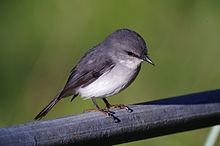White-breasted robin
| White-breasted robin | |
|---|---|
 |
|
| In Western Australia | |
| Scientific classification | |
| Kingdom: | Animalia |
| Phylum: | Chordata |
| Class: | Aves |
| Order: | Passeriformes |
| Family: | Petroicidae |
| Genus: | Eopsaltria |
| Species: | E. georgiana |
| Binomial name | |
|
Eopsaltria georgiana (Quoy & Gaimard, 1830) |
|
| Synonyms | |
|
Quoyornis georgiana |
|
Quoyornis georgiana
The white-breasted robin (Eopsaltria georgiana) is a species of bird in the family Petroicidae. It is endemic to southwestern Australia. Unlike many other Australian robins, it lacks bright colours in its plumage, being a predominantly greyish bird with white underparts. Like many other Australian passerines of the Corvida group, it is a cooperative breeder. It is sedentary, with pairs or small groups maintaining territories.
The white-breasted robin was first described by the French naturalists Jean René Constant Quoy and Joseph Paul Gaimard in 1830 as Muscicapa georgiana. It was later described in its current genus by John Gould in 1846 as Eopsaltria leucogaster, though as the former took precedence its specific name remains georgiana. Like all Australian robins, it is not closely related to either the European robin or the American robin, but belongs rather to the Corvida parvorder comprising many tropical and Australian passerines including pardalotes, fairy-wrens and honeyeaters as well as crows. It belongs to the genus Eopsaltria, whose Australian members are known colloquially as "yellow robins" as distinct from the "red robins" of the genus Petroica. This species has also been known as the white-bellied robin and white-breasted shrike-robin.
A 2009 genetic analysis of nuclear and mitochondrial DNA has unexpectedly placed the white-breasted robin as sister taxon to the two Tregellasia robins native to northeastern Australia.
...
Wikipedia

